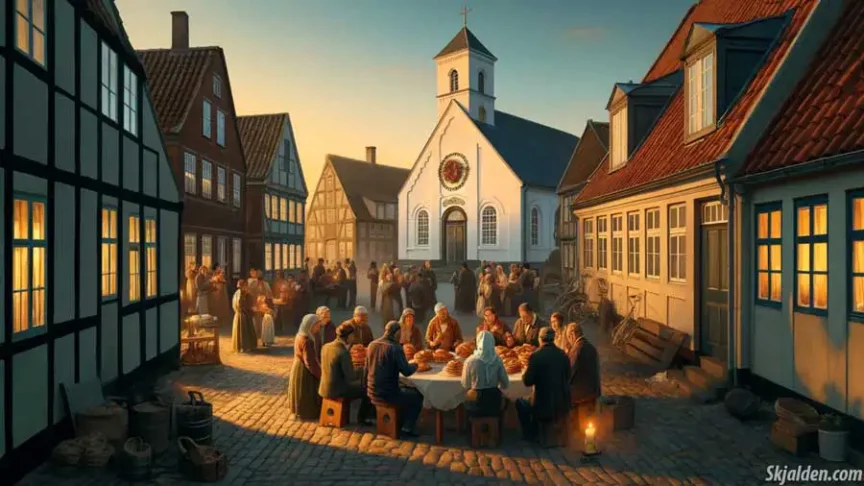Store Bededag, known in English as Great Prayer Day, has been a cornerstone of Danish tradition since 1686. Created by Hans Bagger, the Bishop of Zealand at the time, this day was designed to consolidate numerous smaller prayer days into one significant event. Its primary purpose was to strengthen the community’s spiritual focus and unity during difficult times, such as wars or poor harvests.
The Eve of Store Bededag
The ritual of Store Bededag begins on the evening before the actual day. At precisely 6 PM, church bells ring throughout the towns and cities of Denmark. This tradition serves as a signal for all businesses to close, bringing in a period of silence and reflection.
The ringing of the bells marks a transition from the hustle and bustle of everyday life to a state of collective spiritual participation. This practice ensures that the entire community can participate without the usual distractions or commitments of daily business, setting a solemn tone for the events to follow.
On Store Bededag itself, the Danish people engage in day-long participation in fasting and prayer, which are traditional practices meant to foster humility and spiritual reflection. The fasting begins at sunrise and continues until sunset, improving the reflective nature of the day. This practice is not only a personal discipline but also a public expression of faith and community solidarity.
The church services on Store Bededag are particularly notable for their number and intensity. Unlike regular days, several services are held throughout the day, each designed to accommodate and engage the entire community at different times. These services often include readings from scriptures, hymns, and prayers that are more elaborate and comprehensive than those conducted on typical Sundays. The aim is to provide ample opportunities for everyone to participate fully in the day’s activities, regardless of their usual schedules.
Varme Hveder: Culinary Traditions on Store Bededag
On Store Bededag, it’s traditional for Danes to eat varme hveder, which are warm wheat buns. Historically, since work was not permitted on the holiday, including baking, bakers would prepare these buns the day before. This allowed families to buy them in advance and heat them at home on the holiday evening. Enjoying these warm buns became more than just a practical solution—it turned into a cherished way for friends and families to connect and celebrate together.

The Controversy Over Abolishing Store Bededag
In recent debates, the Danish government, under Prime Minister Mette Frederiksen, finalized the decision to abolish Store Bededag as a public holiday starting in 2024. This policy shift aims to increase labor availability and channel more financial resources towards defense, aligning with broader global security strategies.
This move has ignited significant controversy throughout Denmark, stirring emotions and debate about the balance between economic development and cultural preservation. The abolition is seen by many as a disregard for an essential part of Denmark’s cultural and historical heritage, which has been integral to national identity for over three centuries.
The decision has not only faced public opposition but has also caused notable internal conflict within the Social Democrats, with some members choosing to leave the party in protest. This internal strife highlights the deep divisions over how best to navigate the future of Danish holidays and work-life balance.
Economic Pragmatism vs. Cultural Heritage
The government’s rationale for the abolition of Store Bededag focuses on economic pragmatism—specifically, the need to increase workday availability and boost defense funding amid rising global security concerns. However, this economic focus clashes with strong cultural sentiments that cherish the holiday as a crucial part of Denmark’s cultural fabric, essential for maintaining a connection to Danish history and identity.
Despite its removal as a public holiday, Store Bededag remains a Christian day of significance, observed by those who value its religious and cultural importance. The change requires people to integrate their observance of the day into their regular workday, reflecting the broader shift towards economic efficiency in national policy.
The end of Store Bededag as a public holiday has sparked a broader reflection on how Denmark values and preserves its cultural traditions amid contemporary economic and global pressures. This ongoing conversation continues to highlight the complex interplay between maintaining cultural heritage and adapting to modern economic demands.
